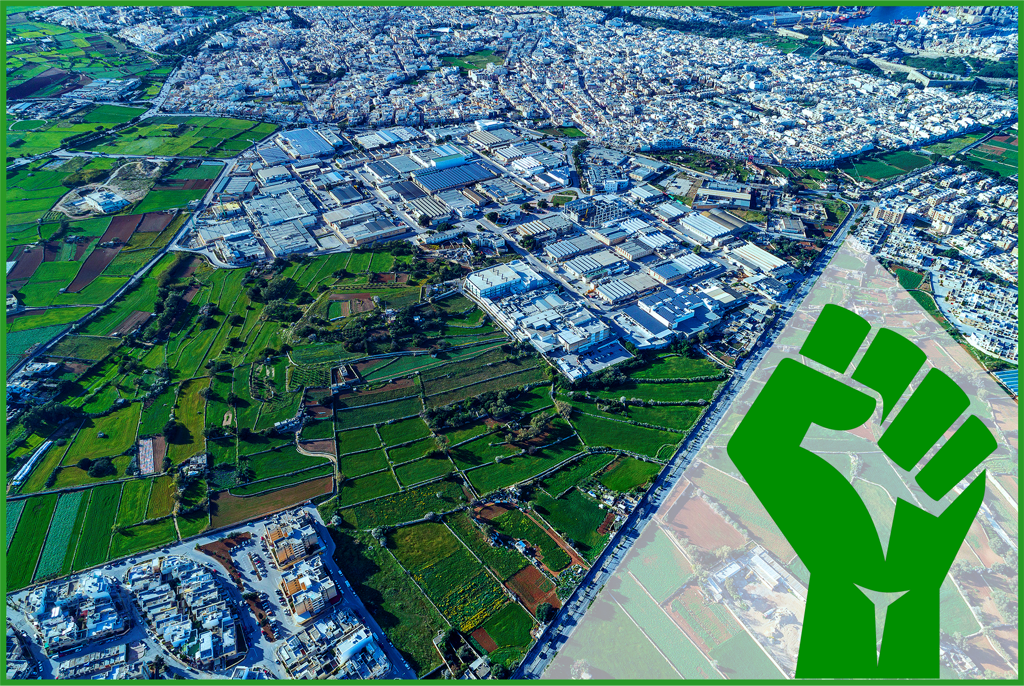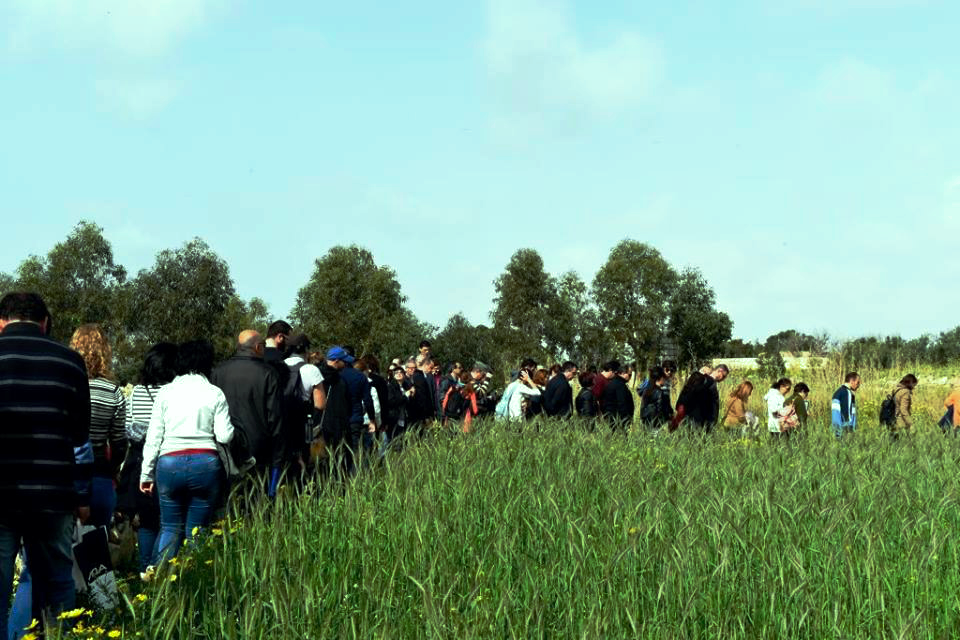
How can communities resist aggressive development? Wirt iż-Żejtun shares a recipe for success.
by Raisa Galea & Rachael Scicluna
[dropcap]I[/dropcap]sles of the Left continues to share stories of successful community resistance to over-development. This time we met with Wirt iż-Żejtun—an NGO and an activist group. Ruben Abela, the NGO’s founder, shared their recipe for success.
Who are the Wirt iż-Żejtun?
Ruben Abela speaks about the organisation:
“Wirt iż-Żejtun is a local NGO which was established in December 2010 by Żejtun residents. We set up a working group, came up with a statute, proposed a membership scheme—and Wirt iż-Żejtun was born. At the moment, the NGO consists of 180 members, 80 of whom renew their membership annually.
We do our best to keep the community aware of the environmental and historical heritage of the area by organising various activities—nature and heritage talks—on a regular basis; these events are well-attended by the locals as well as the residents of other towns. We also organise a symposium every two years.
This year, our activities began with the Bulebel campaign. The first alarming signs of the upcoming development of the area came out in 2015. End of last year, farmers informed us of an eviction notice, ordering them to vacate the land within a month. Our response was to mobilise immediately. We’ve also set a goal: to ensure that the development boundaries of the area are revised.
Although the revision of ODZ boundaries has not yet been formalised, judging by the public statements of the ministers Hose Herrera and Chris Cardona, our community has won the case.”

The Key Points to Consider When Objecting to Development
When asked to share the Wirt iż-Żejtun experience, Ruben Abela listed the following factors that a community needs to pay attention to when protecting the spaces from development. Here they are:
1. Public vs private land
Not every case is the same. The first step is to clarify whether the land, designated for development, is owned publicly or privately. Another important detail is whether the development is to be carried out by a government agency or a private contractor. The chance of a positive (for the communities) outcome is higher if the land is public and a developer is a government agency.
Dealing with private contractors and privately owned sites is different—and more challenging.
2. The political scenario of the day
The political scenario of the day is important. Żejtun is a Labour-voting district and the PL government had to consider this. The electorate’s loyalties could be an advantage and a disadvantage simultaneously. On the one hand, the party in power has to listen to its core electorate. On the other hand, the activists among the community have to be careful in their approach to mobilise the others because their moves might be opposed for partisan reasons. In fact, there were a few who tried to counter our initiative by stating that we are allied with the opposition and that we are ‘against progress’. None of that was true.
In such a scenario, it is very important not to attack individual politicians or the government. The proponent of this development was the Malta Industrial Park, and we have directed our attention towards it.
3. The type of development application
Another aspect to consider is the type of development application. The information on the various types of application can be found on the PA website. For example, the Development Notification Order (DNO) is reserved for cases which do not have an impact on the site context and on neighbouring residences. When developers select this application process, the public is not notified of proposed works and cannot contest it. In such a case, the permit can be issued within 7 days.
We were concerned that the developers could have opted for the DNO process (Class 16 Development in Malta Industrial Parks and Malta Enterprise Zones), meaning that nobody could have had the chance of objecting to the development.
4. Build a strong community whose members support one another
If the reasons above are external and beyond our reach, building a strong, organised community response is within our power.
The community solidarity played a decisive role in safeguarding Bulebel. We were notified of the development plans by the farmers who were ordered to relocate within a month. As soon as we learnt about the plans, we mobilised immediately and the timing was crucial. Had we delayed our campaign by a week, most likely, we would have lost it.
The proposed development also included one of the fields used as a firework’s launching site and that encouraged the local festa enthusiasts to support the campaign. We had members who went from door to door in order to obtain the petition signatures from the residents and others behind the school gates. We could have circulated a digital version of the petition but we decided to strengthen the community ties through human contact. Within days, we collected over 2,000 signatures.
Many contributed to the campaign—and the unity has made a difference.
5. Good knowledge of the system
In any case, it is important to know the procedure of development permits. If you are not aware of the details, seek advice from individuals who have an insight into that and can guide you through the procedure.
6. Know the area you wish to protect from development
Keep an ‘inventory’ of all attractions of the site. No detail is insignificant. Through cooperation between the members of the community and other experts, Wirt iż-Żejtun gathered information on the natural and historic assets of Bulebel. Some told us about the Coat of Arms of Grandmaster Perellos in one of the buildings. Others alerted us to the possible remains of a 16th century church on the site earmarked for development. This information helped us to back our claims of Bulebel’s heritage significance.
7. Be clear, firm and calm in your objectives
In your response to the development, state clearly which outcome you desire. In our case, we insisted on the withdrawal of the development application and on the revision of ODZ boundaries so that further development in the area would not be possible.
Another advice: do not resort to the use of aggressive language during your campaign. Do not respond to provocations such as personal attacks and accusations of being motivated by partisan interests. Do not allow your campaign to be a partisan game—it is not a winning strategy.
8. Focus on environmental and cultural significance of the area
In our objections to the development, we chose to focus on the cultural and environmental—not the economic—importance of the area, as the latter did not fall within the NGO’s remit. We turned it into a social argument which is important enough on its own. Not every argument needs to be supported by the logic of economic efficiency. Leave this reasoning to politicians.
9. Team up with other NGOs (and get the local council on your side too)
Although, to our surprise, major NGOs did not endorse our campaign publicly, we are grateful for the support from Malta Arch, Temple Rescue and Moviment Graffitti. They helped us out in raising public awareness, communicating with the media and organising walks.
Eventually, the local council also backed the objections to the development—and that was game-changing.
10. Reach out to the media
Fortunately, the Maltese media were keeping the public informed of our campaign and all the valuable assets of Bulebel. Illum was the first media which responded to us. The story about the agricultural land being threatened by the proposed development went viral and reached thousands of concerned citizens. We kept the media updated as we were discovering other valuable assets of the site and that helped us to gather more support.
11. Last but not least: avoid being elitist
Cultural heritage is often addressed in elitist terms, as something that needs to be saved from the people. Wirt iż-Żejtun activists did not put themselves above the rest of the community and spoke about Bulebel as a common heritage which needs to be preserved for the benefit of the community. And that’s the way to go!
![]()
Isles of the Left were pleased to learn that Wirt iż-Żejtun activities did not stop there. The NGO is planning to organise more events and the general public is welcome to join. We wish them further success in keeping the frenzied assault on open space away from Żejtun and the surrounding areas. Join them!
Leave a Reply